The Corporate Connect program is a strategic initiative undertaken by Globsyn Business School to integrate various facets of real-life corporate experiences into the curriculum. As a part of this uniquely designed initiative corporate managers share their real-life corporate and business experiences with students not as standalone ‘experience’ sharing sessions but as integral part of the curriculum.
The Corporate Connect program invites senior level executives, entrepreneurs and eminent industry experts from various fields and industry sectors to share their practical experiences in the context of theoretical discourses the students have undergone.
Listed below are some of the recent sessions that took place:
Cultural Competency and Agility in Global Business
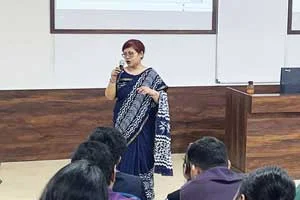
Date: September 8, 2025
Name of Guest Speaker: Ms. Aditi Basu
Designation: Business Communication Strategist, Corporate Storyteller, and Learning & Development Expert
Learning Takeaway: Ms. Basu highlighted the importance of cultural agility and competency in global business, urging young managers to embrace cross-cultural skills. She emphasized inclusive leadership as the key to thriving in multicultural environments.
Different Shades of Strategic Transformation
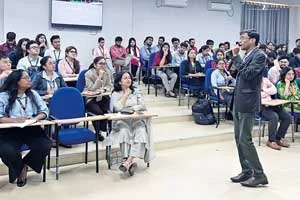
Date: March 25, 2025
Name of Guest Speaker: Mr. Supriyo Sinha
Designation: Director - Transformation & Strategy, Peerless Group
Learning Takeaway: The sessions highlighted how organizations must adapt to changing market dynamics through strategic transformation. He emphasized aligning vision, innovation, and execution to build resilience, drive growth, and stay competitive in an evolving business landscape.
Marketing Insights
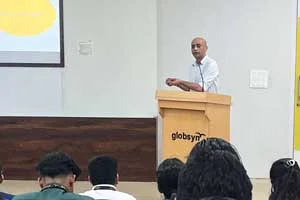
Date: March 20, 2025
Name of Guest Speaker: Mr. Aashish Shukla
Designation: General Manager, Business Insights, ITC Limited
Learning Takeaway: Mr. Shukla explained key sources of trade insights, the role of marketing research tools, and why knowing consumers better than competitors is crucial for success.
Introduction to Operations Management in IT industry
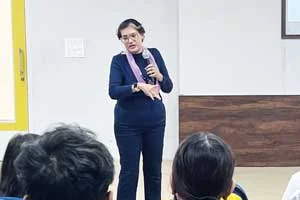
Date: March 13, 2025
Name of Guest Speaker: Ms. Soma Roy Sarkar
Designation: Director, Operational Excellence, Cognizant Technology Solutions Corporation
Learning Takeaway: Ms. Roy Sarkar’s session on ‘Introduction to Operations Management in the IT Industry’ highlighted how operations optimize resources, improve efficiency, and streamline workflows, while showcasing the transformative impact of AI-driven automation on business processes.
Building Capability, Managing & Nurturing Talent for Future-ready Workforce
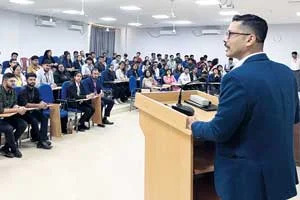
Date: March 4, 2025
Name of Guest Speaker: Mr. Sumanta Chaudhuri
Designation: Vice President & Head HR – East, Vodafone Idea Limited
Learning Takeaway: Mr. Chaudhuri emphasized the importance of building future-ready talent by focusing on capability development, effective talent management, and nurturing leadership potential to meet evolving industry demands.
The Importance of Aligning Marketing Strategies with Consumer Expectations
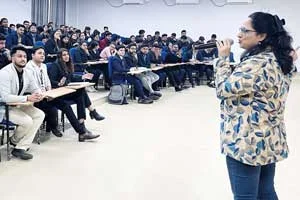
Date: January 27, 2025
Name of Guest Speaker: Ms. Shalini Gupta
Designation: Founder & CEO, Secret Sauce Communications Pvt. Ltd.
Learning Takeaway: Ms. Gupta emphasized that successful marketing begins with a deep understanding of consumer behavior. She highlighted how aligning strategies with evolving customer expectations helps brands build stronger connections, enhance loyalty, and drive sustainable growth.
Managerial and Leadership Attributes
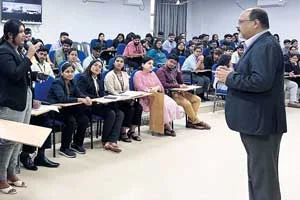
Date: November 18, 2024
Name of Guest Speaker: Mr. Sandeep Banerjee
Designation: CHRO, Eveready Industries India Ltd.
Learning Takeaway: Mr. Banerjee shared insights on the core attributes of effective managers and leaders, emphasizing strategic decision-making, people management, adaptability, and ethical leadership as vital traits for driving organizational success.
Generative AI and its Risks
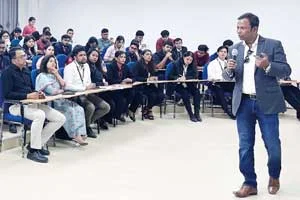
Date: November 15, 2024
Name of Guest Speaker: Dr. Sandipan Sarkar
Designation: Distinguished Engineer, IBM Consulting
Learning Takeaway: He conducted a session on ‘Generative AI and its Risks’, urging students to understand Machine Learning and its evolution to gain better perspective. Dr. Sarkar emphasized the need for young managers to apply AI responsibly, considering its profound impact on humanity.
Modern Marketing Practices
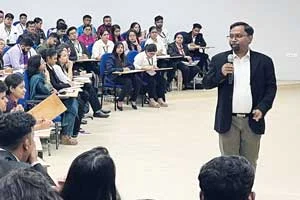
Date: October 23, 2024
Name of Guest Speaker: Mr. Wilson Purty
Designation: Chief of Marketing, Branded Products (ECA), Tata Steel
Learning Takeaway: Mr. Purty enlightened the young managers on product differentiation and market segmentation, giving them an understanding of customer and competitor types.
The future of work in an era of Exponential Technologies
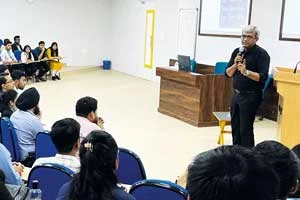
Date: March 11, 2024
Name of Guest Speaker: Mr. Deb Kumar Majumder
Designation: Partner & Client Services Leader, IBM Consulting, CIC India
Learning Takeaway: In this session, Mr. Majumder discussed the future trends of Generative AI and how it has democratized Data Science, focusing on the requirement of upskilling the workforce to sustain jobs.
Emerging trends in ESG and Sustainability
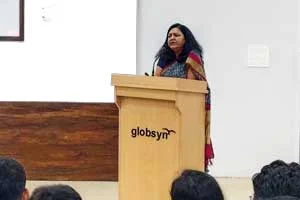
Date: March 5, 2024
Name of Guest Speaker: Ms. Sushmita Ghatak
Designation: Strategic Advisor, Athena Infonomics, and ex-MD & CEO, ICRA Analytics Ltd.
Learning Takeaway: Ms. Ghatak highlighted how ESG is reshaping business strategy and urged young managers to integrate sustainability with profitability for long-term success.
Ethics in Governance
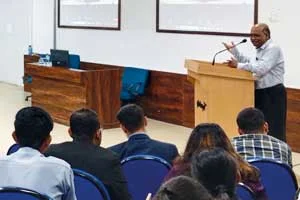
Date: March 1, 2024
Name of Guest Speaker: Mr. Anindo Majumdar
Designation: IAS (Retd.), Member – Central Administrative Tribunal, Kolkata Bench
Learning Takeaway: Mr. Majumdar discussed ethics in governance from government and corporate lenses, illustrating concepts like gender bias, accountability, integrity, and ethical dilemmas through real-life examples.
Market Research for Business Decisions
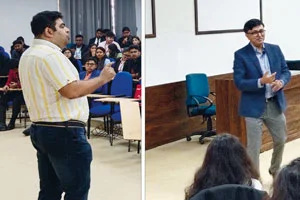
Date: February 19, 2024
Name of Guest Speaker: Mr. Somik Roy
Designation: Executive Director, NielsenIQ
Name of Guest Speaker: Mr. Jaydeep Guha
Designation: Lead – Worldwide Insights, Lenovo
Learning Takeaway: Mr. Roy and Mr. Guha highlighted the role of market research in business decisions, explaining key techniques and how entrepreneurs and clients use them to guide new product launches.
Business is Marketing, Marketing is Business
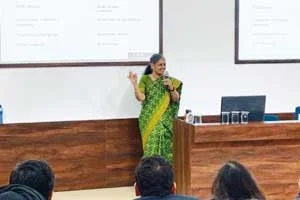
Date: February 6, 2024
Name of Guest Speaker: Ms. Jayashree Mohanka
Designation: Former Director and CEO, Electro Zavod India
Learning Takeaway: Ms. Mohanka spoke on ‘Business is Marketing, Marketing is Business,’ highlighting branding techniques, customer segmentation, and effective communication channels to enhance market visibility.
Creativity in Advertising
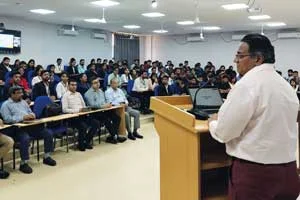
Date: November 6, 2023
Name of Guest Speaker: Mr. Suresh Balakrishna
Designation: Chief Revenue Officer, The Hindu Group
Learning Takeaway: Mr. Balakrishna discussed different forms of creative advertising, showcased campaigns by top brands to illustrate out-of-the-box thinking, and highlighted the role of media in connecting brands with their target audience.
Strategic Cost and Finance Management
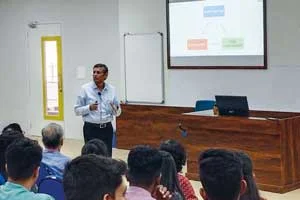
Date: October 17, 2023
Name of Guest Speaker: Mr. Sanjay Kumar Shrivastav
Designation: Joint Chief Financial Officer, TATA Steel Long Products Limited
Learning Takeaway: Mr. Shrivastav explained cost management techniques, their role in enhancing a business’s strategic position, controlling costs in modern environments, and creating shareholder value through improved profits.
Strategic Value of HR
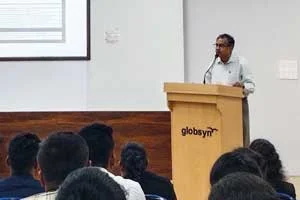
Date: October 10, 2023
Name of Guest Speaker: Mr. Rahul Bose
Designation: Ex-IBM, Business Consultant and Trainer
Learning Takeaway: Mr. Bose elaborated on the importance of developing a value system, and significance of the strategies that an HR professional must employ for the better functioning of the organisation.
Quest for Rediscovering Oneself
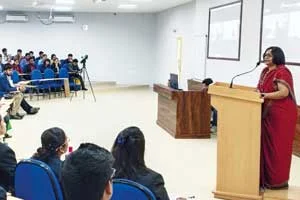
Date: October 6, 2023
Name of Guest Speaker: Dr. Ratna Sinha
Designation: Vice President – HRM, TATA Metaliks
Learning Takeaway: Dr. Sinha emphasized empathy, nurturing workplace relationships, and continuous learning as keys to personal and professional growth and achieving organizational goals.
Principles of Effective Business Communication
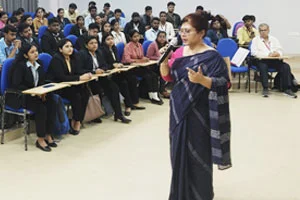
Date: September 29, 2023
Name of Guest Speaker: Ms. Aditi Basu
Designation: Marketing Communications Consultant and Workplace Trainer
Learning Takeaway: Ms. Aditi Basu emphasized the core principles of effective business communication, highlighting clarity, professionalism, and the art of active listening. She also shared insights on making strong first impressions through impactful self-introductions, helping students sharpen skills essential for corporate success.
Cyber Bullying Prevention in Educational Institutions
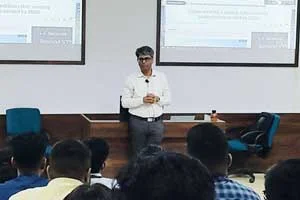
Date: September 20, 2023
Name of Guest Speaker: Mr. Sandeep Sengupta
Designation: Director, Indian School of Anti-Hacking (ISOAH)
Learning Takeaway: Mr. Sengupta spoke on Cyber Bullying Prevention in Educational Institutions, addressing cybercrime risks, student data safety, job search practices, and the evolving landscape of cybersecurity policies, career opportunities, and future threats.
Business and Beyond
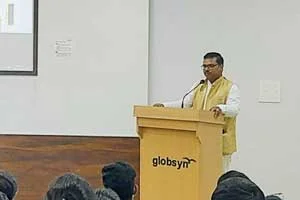
Date: September 19, 2023
Name of Guest Speaker: Dr. Arijit Banerjee
Designation: Executive Director, Ramaesis RPL Perfect Pause
Learning Takeaway: Dr. Arijit Banerjee spoke to the Semester I students of Batch 2023-25 on ‘Business and Beyond’ about his journey on how he became an entrepreneur, and why social entrepreneurship is important to have a sustainable future for society as a whole.
Sustainability and Transition to Low-Carbon Economy
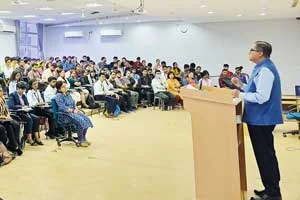
Date: July 26, 2023
Name of Guest Speaker: Mr. Sudipta Kumar Mukherjee
Designation: Executive Director (Thermal Generation), CESC Limited
Learning Takeaway: Mr. Mukherjee highlighted the importance of sustainability and the transition to a low-carbon economy, discussing strategies for reducing carbon emissions in thermal power generation and promoting environmentally responsible energy practices.
Preparing the Foundation for HR Analytics
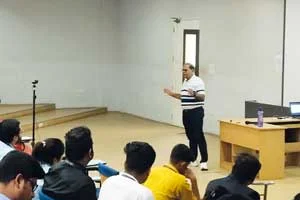
Date: March 15, 2023
Name of Guest Speaker: Mr. Vishal Verma
Designation: HR Head, Alumnus Software Limited
Learning Takeaway: Mr. Vishal Verma emphasized the importance of “doing things rightly” in HR and highlighted how HR Analytics enables non-conventional decision-making. He explained the four levels of HR Analytics: Descriptive, Diagnostic, Predictive, and Prescriptive Analytics.
Consumer Insights
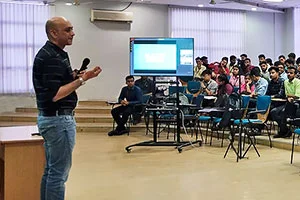
Date: February 28, 2023
Name of Guest Speaker: Mr. Aashish Shukla
Designation: General Manager- Business Insights, ITC Ltd.
Learning Takeaway: Mr. Shukla emphasized the importance of deep consumer insights in driving strategic business decisions and fostering brand growth. He emphasized the importance of understanding consumer behavior to create a meaningful market impact.
Competency-Based Management for Business Performance
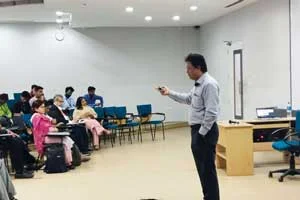
Date: February 15, 2023
Name of Guest Speaker: Mr. D John Robert
Designation: Country Head – Employee Relations, Bosch Limited
Learning Takeaway: Mr. Robert emphasized that while skills and knowledge can be learned, attitude is crucial for success, along with prioritizing employee wellness and work-life balance.
The Marketer's Guide to Segmentation, Targeting, & Positioning
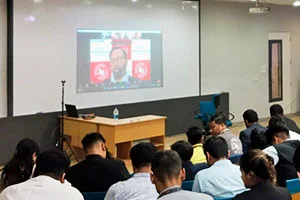
Date: February 10, 2023
Name of Guest Speaker: Mr. Wilson Purty
Designation: Chief of Marketing – Branded Products (ECA), Tata Steel
Learning Takeaway: Mr. Purty enlightened young managers on segmentation, core competencies for sustainability, and positioning, linking segmentation with innovation and illustrating diverse market orientations through practical examples.
Rural Marketing: The Last Mile Connectivity in Terms of Distribution
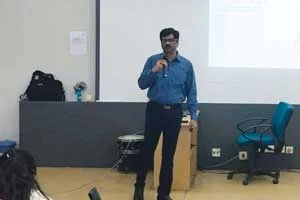
Date: February 7, 2023
Name of Guest Speaker: Mr. Kunal Gupta
Designation: Former Vice President – Sales, Eveready Industries
Learning Takeaway: Mr. Gupta elaborated on the importance of rural marketing in today’s world, how it helps in reaching out to the end consumer, various strategies used in rural marketing, examples of rural marketing success stories and various channels of distribution and participants of the distribution channel in a rural market environment.

